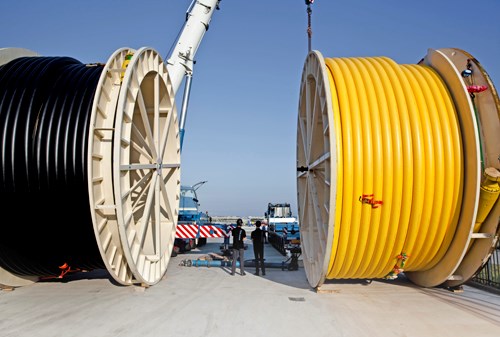Thermoplastic composite riser making waves in oil and gas work
The use of composites in deepwater oil and gas drilling has been long sought, and few companies have been more active than Netherlands-based Airborne Oil & Gas, which manufacture thermoplastic composite pipe that is being tested in Brazilian waters.

Massive spools of Airborne Oil & Gas' thermoplastic composite pipe.
Thermoplastic oil and gas pipe specialist Airborne Oil & Gas (IJmuiden, The Netherlands) says the Libra consortium has invited Airborne to perform a failure mode, effect and criticality assessment (FMECA) for a thermoplastic composite pipe (TCP) Riser that could be used at the giant Libra field offshore Brazil. The request followed a successful feasibility study (preliminary version) performed by Airborne Oil and Gas and Wood Group Kenny, that showed a 45% reduction in top tension in a cost-effective riser solution, using a hybrid riser design comprising of the conventional flexible pipe (used for the top and bottom riser-sections) and the TCP section inserted at the mid-water depth.
Henk de Boer Ph.D., engineering manager Airborne Oil & Gas, says, "We are independent in our material choice and select the right material for every application. In this case, we assessed three different composite materials in the riser design and optimized it for installation, fatigue, top tension and pipe cost. Interestingly, the most cost effective riser solution turned out to be the technically best performing as well."
Airborne says the TCP Riser solution (provided for the full riser length) could offer significant benefits in deep water riser applications: first, the lightweight TCP Riser reduces the top tensions up to 50% (as compared with the conventional flexible pipe), reducing the weight loading on the floating, production, storage and offloading (FPSO) vessel. Second, says Airborne, the TCP Riser itself is a simple monolithic wall pipe; while still flexible, it is inherently simple in its design leading to a cost effective solution for deeper waters.
Airborne Oil & Gas is the world's first manufacturer of Thermoplastic Composite Pipe (TCP) to have qualified its design, production and materials in compliance with the new DNV Recommended Practice for Thermoplastic Composite Pipe, DNVGL RP F119. The FMECA will be conducted in accordance to this recommended practice.
Related Content
-
Honda begins production of 2025 CR-V e:FCEV with Type 4 hydrogen tanks in U.S.
Model includes new technologies produced at Performance Manufacturing Center (PMC) in Marysville, Ohio, which is part of Honda hydrogen business strategy that includes Class 8 trucks.
-
Collins Aerospace to lead COCOLIH2T project
Project for thermoplastic composite liquid hydrogen tanks aims for two demonstrators and TRL 4 by 2025.
-
RTM, dry braided fabric enable faster, cost-effective manufacture for hydrokinetic turbine components
Switching from prepreg to RTM led to significant time and cost savings for the manufacture of fiberglass struts and complex carbon fiber composite foils that power ORPC’s RivGen systems.










.jpg;maxWidth=300;quality=90)

